
Apparently, those who are supposed to answer this question according to their service have found the answer. And they have taken measures. Last Tuesday, Logos Press, citing Moldovan pig importers, who wished to remain unnamed, reported that almost a dozen cattle trucks with pigs for slaughter were turned back at the border between Romania and Moldova (on the Romanian side).
The reason was probably a document adopted by the Romanian authorities following an emergency meeting on the outbreaks of foot-and-mouth disease in a number of EU countries. It was held on March 11 by the Romanian Cabinet together with the National Committee for Emergency Situations and the National Center for Disease Control. The document, among other things, refers to a ban on the traffic of vehicles transporting livestock between Hungary and Romania.
It can be assumed that the corridor was preserved for the transit of Hungarian pigs to the Republic of Moldova by some interagency agreement, probably not widely publicized. After the video about the transportation of pigs to Moldova was seen by many people in both countries, the agreement on the supply corridor, presumably, became inconvenient. Therefore, blocking of livestock trucks at the border is not a failure in the system, but rather a resumption of the system’s normal operation.
Now, who benefits (or, rather, does not benefit) from this situation. First of all, it is not favorable for the authorities of the two brotherly countries, because it puts them in a bad light. It highlights, at least, intra- and/or inter-agency alliances, contradictions, intrigues, struggles, etc. Even worse, the presence of live pig transit corridors in considerable numbers casts doubt on the seriousness of the intentions of the authorized agencies to fight foot-and-mouth disease, African swine fever, etc.
Also not beneficial is the stoppage of transit to those Moldovan pig-breeding companies, which intended at the expense of imports of live animals from the European Union (it is liberalized, unlike the import of meat from the EU to the Republic of Moldova in excess of duty-free quotas) to fill the emerging deficit of pork on the Moldovan market. And it is certain to arise due to the recent emergency slaughter of about 118 thousand pigs at the two largest pig farms in the country affected by African swine fever.
By and large, blocking the import of live pigs for slaughter is not beneficial for Moldovan meat processors, producers of sausages and other meat products. For them, supplies of Spanish, Hungarian, Polish, German, Dutch – yes, in principle, it does not matter whose – pigs would be an occasional, unstable, but still a postponement of the moment when the meat market of Moldova will have a clear deficit of commercial pork and unrestrained growth of purchase prices for it. I repeat, it will come, because it will not be possible to quickly, qualitatively and safely compensate the market for a hundred thousand pigs that were forced to be utilized – biologically, financially, and now also logistically.
What could be the consequences and alternatives? If the corridor of pig supplies to Moldova by transit through Romania closes for a long time, the Moldovan market may find itself without imported animals “with European pedigree” at all.
The problem is that for quarantine reasons, many years ago the Government of the Republic of Moldova decided (No. 1115 of 07-10-2016) to stop the import of live animals from Ukraine until this country is recognized by the World Organization for Animal Health as a territory free of African swine fever. Meanwhile, as recently and repeatedly stated by the head of the MAIA Agriculture and Food Ministry Ludmila Catlabuga, wild boars are fleeing the war in Ukraine to the territory of RM and infecting their Moldovan brethren and domestic pigs with African swine fever. This is tantamount to admitting that there is ASF in Ukraine.
However, in private conversations, employees of the National Agency for Food Security ANSA express the opinion that the import of pigs of Ukrainian origin into the Republic of Moldova from Ukraine is indeed still prohibited. But the transit of European pigs through Ukrainian territory is possible.
Some experts qualify this approach as “loss of institutional and legal memory”. But for the market and economy it can be useful at times.

